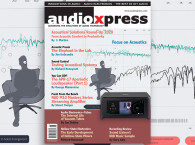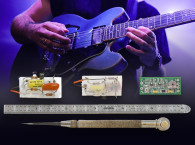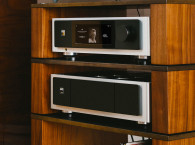Article by Rens Tellers and Jan Didden

We have all been to audio shows, walking the halls with high expectations. We have also been disappointed in some cases when a line-up of great equipment didn’t really sound that good. It is also disappointing for the exhibitor, who often spends large amounts of money on the exhibition.
While it is not always easy to pinpoint what was wrong, I can think of at least two possibilities: parts of the equipment setup may not “fit” with each other (e.g., an amplifier that is not optimal for a specific speaker system), or the room where the system is set up may have unfavorable acoustics.
Of course, manufacturers are aware of these issues and try to make the best of it. One group, brought together by Uli Brüggemann from AudioVero, recently decided to tackle these problems holistically and invited audioXpress to a preview of their system, which will be demonstrated in public at the May 2024 Munich High End show.
The Plot
The initiators of the Pure Acourate Sound project are Brüggemann, Markus Grelka, and Ralf Höllmann. The partners involved in this unique system are Purifi Audio, Okto Research, GIK Acoustics, Klippel, Roon, AudioVero, Rose Handwerk, and Joachim Gerhard. The project is supported by the High End Society.
The goal of this project was to design an excellent system for the show that would allow visitors to judge the performance of the audio system, not limited by poor equipment choices or bad room acoustics. Its designers also intend to show that great sound is possible even in small spaces.
The Play
Marcus Grelka of Rose Handwerk makes great wooden furniture in the German Sauerland region. Grelka also loves high-end audio. Just by coincidence, Joachim Gerhard, a renowned speaker designer, lives almost next door; the two got together and now Rose Handwerk builds artisanal speakers for Gerhard’s own Suesskind Audio brand. Their cooperation resulted in a unique speaker design, directly supported by Purifi Audio, including the first ever implementation of its latest PTT10.0X 10” woofer (Photo 1 and Photo 2).


The separate bass enclosure appears to include no less than six woofers, but in fact, four of those are matching Purifi passive units acting like acoustic impedances on the sides of the cabinet. With the new Purifi woofers and these passive membranes, the response was extended to 17Hz, and the enclosure size remains manageable.
For the top cabinet, Gerhard decided to use a well-known midrange-tweeter-midrange (MTM) d’Appolito arrangement, with two Purifi PTT6.5W08-NAA-08 Ultra Low Distortion Woofers and a Viawave GRT-145W-8 sealed ribbon tweeter in between them. To increase vertical dispersion, the high-frequency unit’s waveguide is shortened so the two midranges are as close together as possible (Photo 3). The speaker was then taken to Klippel’s own facilities in Dresden, for full measurements and characterization, allowing Brüggemann and Grelka to further optimize the setup.

For amplification, they wanted powerful yet transparent and reliable amplifiers — again, a call to Purifi provided the solution. Each channel and side of this three-way speaker system is driven by its own Purifi Eigentakt ET400A amplifier modules, powered with Hypex power supplies, nicely packed in Rose-Handwerk amplifier chassis with brushed aluminum front panels that match the Okto Research DAC (Photo 4).

The next step was the realization that driving the six Purifi output stages requires at least a six-channel DAC. Six or more channel DACs that are affordable and high-performance are relatively rare — the team settled on the latest OKTO Research DAC8 Pro (Photo 4).
But the elephant in the room was, of course, the room itself. The next act in our play brings in Brüggemann from AudioVero, the designer of Acourate room correction software that helps Bob Katz among others to produce his award-winning recordings. Acourate is actually an application that does much more than room acoustic corrections, since it also generates crossovers and FIR filters, applying correction filters for speaker drivers and the listening room. It focuses on enabling the best sound reproduction in an acoustic space and it does that extremely well (Photo 5).

Figure 1 shows the as-is frequency response with the individual drivers already corrected in near-field (top). The room corrected plot (middle trace at the listening position) shows a well-behaved system. You can see that the Acourate correction does not try to completely correct for the response dips. Before generating the correction coefficients, it does some psycho-acoustic processing on the speaker measurement results, which decreases the dip amplitudes. This strikes a balance between fully compensating the dips, which cost dynamic range, and allowing some small dips with very low audibility. The lower plot in Figure 1 shows the target curve, which is a very important aspect in getting it right.

Acourate performs several processing steps toward the final correction filters. It measures each speaker individually and generates a response correction to make it as linear as possible. It generates the filter coefficients for the requested crossover parameters. It then asks the user to specify a target response, measures the room and finally generates the overall filter parameters for each side and each frequency range. The resulting file can be used in your own setup but can also be generated in the syntax to be imported by JRiver or MiniDSP. As Figure 2 shows, this is extremely effective, and is borne out in the listening tests.

The Set
Acourate does a great job of creating a coherent and stable soundfield. But the less acoustically challenging the room is, the better the end result will be, and the wider the listening area where the room filters are effective will be. Therefore, the room acoustics are already tamed with the judicious use of diffusers and absorbers from GIK Acoustics. GIK offers several white papers on its “Education” page discussing room treatment, how it works, what it does, how to select a particular method, as well as some “before and after” sound files to audition. GIK also offers a free consultation to help you make a choice.
Roon offers another vital component to the listening environment, streaming the music to the DAC through a highly optimized dedicated PC. A typical Windows operating system requires about 50 to 100 processes running at the same time, with the CPU involved in every single thread and process. These eventually will be executed in a manner that can (and do) interfere with the audio streaming software. Reducing the number of non-essential processes and threads on the CPU will reduce the potential interference, greatly reducing the chance of dropouts and/or loss of synchronization. This goes much, much further than disabling the Windows sound processing, but optimizes the system with a single goal in mind: optimal and uninterrupted music streaming. The Audiophile Optimizer takes over the PC and disables or deletes everything that isn’t required for music reproduction. Setting it up is an involved process but it is well documented in an extended User Guide.
With so many different actors, Ralf Höllmann makes sure they all read from the same script. Figure 3 shows a simplified overview of what is involved in the Pure Acourate Sound project.

As you can see in Figure 4, the crossover filters roll off very sharply. This allows the designer to use a given driver closer to its passband edge, without including the driver anomalies that normally occur near the passband. These unique filters, which maintain a linear phase response with minimal ringing, are a unique development by Brüggemann.

The Review
After all was said and done, it was time for a listening session. The system as set up sounded absolutely great. The detail and resolution was immaculate to our ears. There was no trace of response irregularities from room reflections or standing waves. Bass reproduction was firm with no booming or other issues, and available power seemed endless. Brüggemann demonstrated the effect of the room correction by switching it on and off, allowing us to appreciate what an already competent room treatment can do, but how much improvement can be obtained that way. Photo 6 shows a few members of the Pure Acourate Sound Team after completing a day of measurements.

The speakers were set up on a relatively wide base — allowing for a wider demonstration area but making the sound field a bit too wide. That is a question of personal preference and in no way detracts from the system’s performance.
When the system is moved to be presented at the High End show in Munich, the complete setup will again be measured and optimized for that particular venue, a 24m2 listening space. When searching for the best system we can get, it is important to realize that this optimization can be done for any room, including your own private listening room.
A deciding factor for the result is the holistic system approach, optimizing each link in the chain. The separate components of this system are all first rate, bound together with the Acourate software, optimizing the final response to the room.
This project shows that it is possible to produce ultra-low distortion sound without bass boom. The Pure Acourate Sound Project created an excellent sounding system, which will sound great even at a typical audio show. In an industry with often fierce and aggressive competition, this is a commendable project that will, ultimately, benefit the listener.
Where to Audition the System
Attend the Munich High End show in May, visit this unique setup, and meet its designers in Hall 3, Room K05. Take your time, listen, and talk to the initiators of this unique project. It is also likely you will be able to meet a member of the audioXpress team while there. aX
Resources
Acourate room eq, www.audiovero.de/en
“Audiophile Optimizer Setup Guide,” Highend-AudioPC,
www.highend-audiopc.com/PDF/audiophile-optimizer-setup-guide.pdf
“Audiophile Optimizer Software,” Highend-AudioPC,
www.highend-audiopc.com/audiophile-optimizer
M. Barnett of Acourate Sound has written a user guide, YouTube videos and many tips for Acourate on his website, digitalloudspeaker.com
GIK Acoustics, https://gikacoustics.net
Klippel, www.klippel.de/index.html
Okto Research DAC8 Pro, www.oktoresearch.com/dac8pro.htm
Purifi Audio, https://purifi-audio.com
Roon audio streaming, https://roon.app/en
Rose Handwerk, www.rose-handwerk.de
Suesskind Audio, https://suesskindaudio.de/en
“The Pure Acourate Sound Project,” Pure Acourate Sound,
https://pureacouratesound.com
This article was originally published in audioXpress, May 2024







